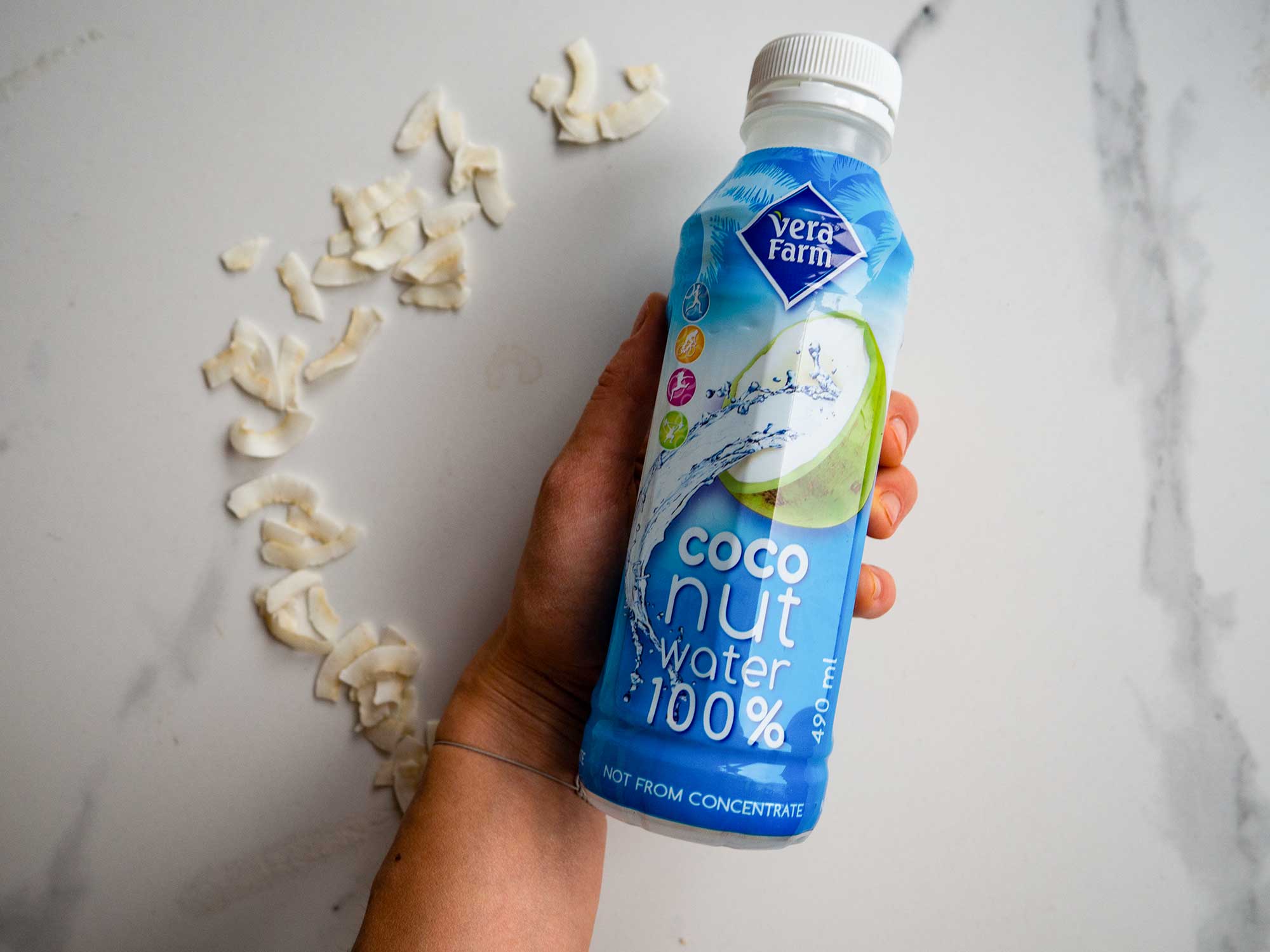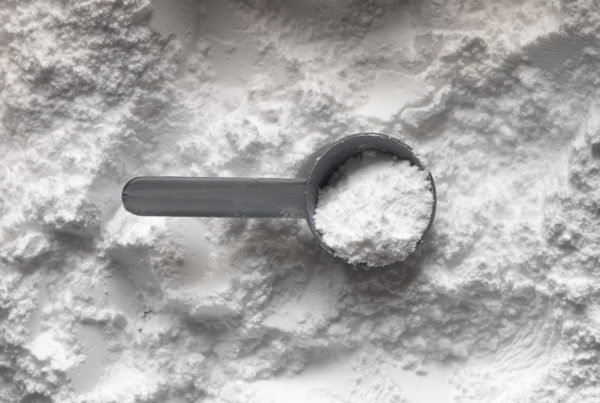Coconut Water, What Should You Know?
1. Is Coconut Water Good for You?
2. Nutrition Facts of Coconut Water
3. Health Benefits
4. Coconut Water as an Isotonic
5. Coconut Water During a Slimming Diet
1. Is Coconut Water Good for You?

You probably have seen the holiday photos of smiling people with coconut in their hands more than once. Real Instagram picture, right?
Coconut water, not yet so popular in countries with temperate climate, in tropics reached the hearts of not only natives. As you can find it on almost every palm, it is a very cheap and tasty product in these countries, but is that all it is about?
What properties and applications does coconut water have and why is it so desirable among tourists? Is this all about hype? Certainly not!
I invite you to read this article, which presents you more about the health benefits of this fruit.
2. Nutrition Facts of Coconut Water

Coconut water is a drink that is obtained from still young, green palm fruits. It goes to the store in sterile conditions straight from the fruit, thanks to which it does not lose its nutritional value. During shopping, I recommend checking the composition, because some products may contain sugar, flavors, other juices or coconut cream use to improve the taste, which increases its overall calorific value.
Pure water from a young coconut is a relatively low calorie drink. In 100 g of this isotonic you will find 24 calories, 0.7g of protein, 0.2g of fat and 4.8g of carbohydrates. Unfortunately, this drink does not contain fiber.
What valuable ingredients can we find in addition?
| Magnesium | 25 mg |
| Potassium | 294 mg |
| Calcium | 24 mg |
| Phosphorus | 21 mg |
| Ferrum | 0,29 mg |
| Sodium | 25 mg |
| Vitamin C | 2,4 mg |
| Vitamin B1 | 0,03 mg |
| Vitamin B2 | 0,057 mg |
| Niacin | 0,08 mg |
| Pantothenic acid | 0,043 mg |
| Vitamin B6 | 0,032 mg |
As the table above shows, coconut water is a great source of electrolytes, mainly potassium. Their values are comparable to those contained in blood plasma, thanks to which in extreme conditions, coconut water was used as a substitute during World War II.
3. Health Benefits
It is said that drinking coconut water brings many health benefits. Due to the presence of magnesium, it is especially recommended for people exposed to stress. High potassium content makes this water recommended for hypokalemia.
As a source of electrolytes, it supports the nervous system and is recommended during diarrhea or vomiting [1].
Thanks to this rich electrolytes composition (K, Na, Ca, Mg and L-arginine) it has a beneficial effect on the circulatory system. Studies at the University of India have shown a decrease in total cholesterol, triglycerides and phospholipids in the blood in volunteers consuming this drink [2].
It has also been shown that by consuming coconut water reduce the risk of coronary heart disease [3].
Some sources say that due to the content of kinetin – a plant growth hormone, whose main task is cell division and the fight against free radicals, drinking coconut water delays the aging process in the human body. However, this has not been confirmed by any scientific research.
This water is also attributed to the properties associated with the content of group B vitamins or vitamin C. As you can see in the table above, these are not large amounts that would not have a significant impact on our health. In this case, the wonderful effect of the drink seems to be slightly exaggerated by the media marketing procedure.
4. Coconut Water as an Isotonic
Due to the content of electrolytes (Potassium, Sodium, Magnesium), coconut water is known as a natural isotonic.
It is especially recommended for athletes after intensive training to supplement lost minerals. It is often said to be better than pure water or traditional sports drinks. Is this true?
Well, there is no scientific evidence confirming such a belief. What’s more, the 2017 study on women who completed a 60-minute bicycle session hydrated with coconut water did not show better results compared to regular pure water [4].
Other studies compared the consumption of coconut water enriched with sodium with the consumption of ordinary coconut water, isotonic beverages and pure water. It has been shown that the consumption of coconut water enriched with sodium is as effective as the consumption of artificial isotonic beverages [5].
The choice between these two drinks will therefore mainly depend on personal taste preferences. Given the natural coconut water and its low sodium and carbohydrate levels, this drink may not be enough to replenish those ingredients lost during sports lasting more than 90 minutes (e.g. cycling).
On the other hand, it has a higher potassium content than in traditional sports drinks. The advantage of natural coconut water is definitely lack of artificial colors, flavors and preservatives.
5. Coconut Water During a Slimming Diet
On the internet, we can often find some information that coconut water is recommended for slimming diets.
This is not entirely true.
Despite the fact that it is deliberately chosen, it does not contain added sugars or additional substances, its composition naturally contains simple sugars, consequently additional calories in our diet.
In 500 ml of pure coconut water we can find 33 grams of sugars, including 36% fructose, 41% glucose and 23% sucrose. Although it is much better in this respect compared to other fruit juices, clear water still does not contain any simple sugars or calories.
In addition, contrary to popular opinion, coconut water does not contain substances that burn fat or increase metabolism. So, for people trying to lose some weight I would recommend pure mineral water.
Coconut water can definitely be classified as healthy products. If you like it’s taste, you can occasionally add it to your daily menu. However, it should be remembered that when it comes to its beneficial properties and nutrients contained in it, is not irreplaceable. Potassium, sodium, magnesium or other minerals can also be delivered to the body through other, much cheaper foods.
Literature:
- Adams W, Bratt DE, Young coconut water for home rehydration in children with mild gastroenteritis. Tropical and Geographical Medicine, 01 Jan 1992, 44(1-2):149-153 PMID: 1496708
- P. Anurag, T. Rajamohan Cardioprotective effect of tender coconut water in experimental myocardial infarction. Department of Biochemistry University of Kerala India
- Anonymous (1961) Biochemical composition of coconut water. Curr Sci 30: 363
- Peart DJ, Hensby A, Shaw MP, Coconut Water Does Not Improve Markers of Hydration During Sub-maximal Exercise and Performance in a Subsequent Time Trial Compared with Water Alone. Int J Sport Nutr Exerc Metab. 2017 Jun;27(3):279-284.
- I Ismail, R Singh and RG Sirisinghe Rehydration with sodium-enriched coconut water. Sports Science Unit, Department of Physiology, School of Medical Sciences, Vol 38 No. 4 July 2007







